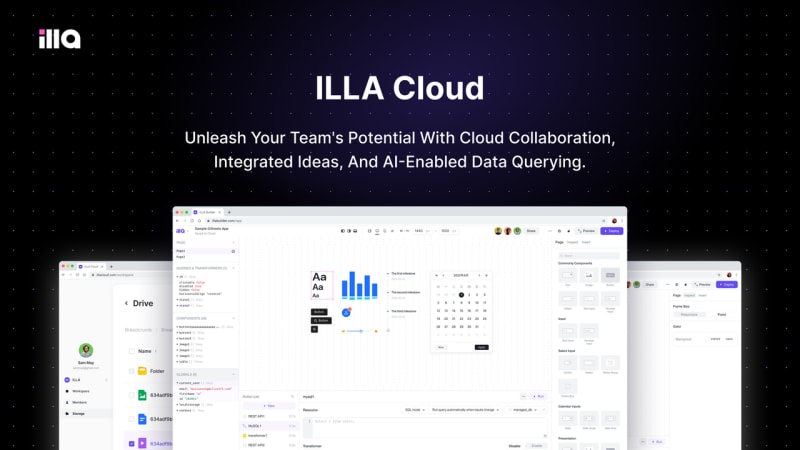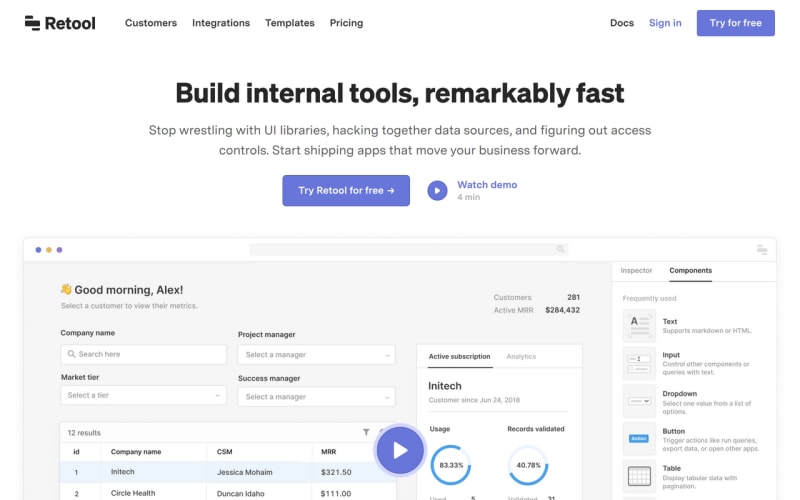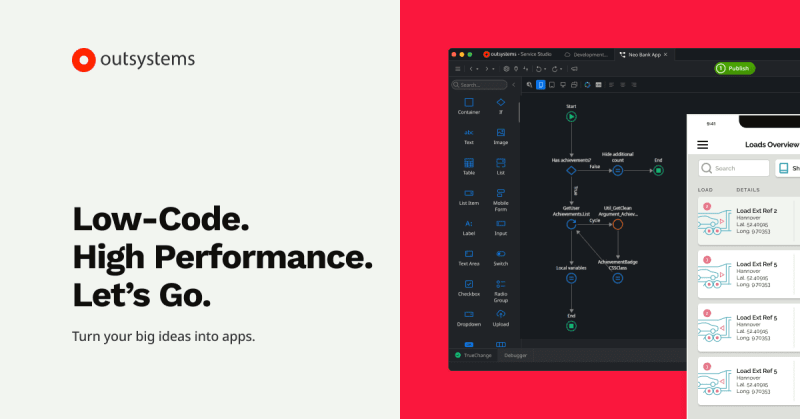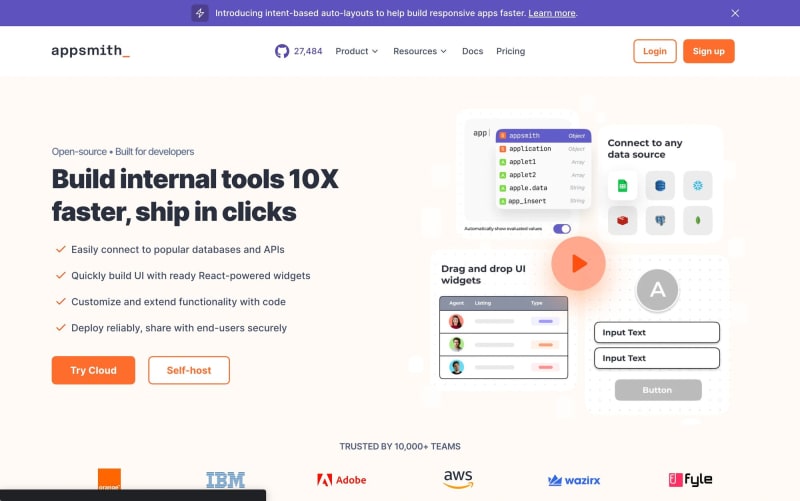In today's fast-paced digital landscape, businesses are constantly seeking ways to streamline their application development process and deliver innovative solutions efficiently. This is where self-host low-code development platforms come into play. These platforms offer a range of features and functionalities that enable organizations to rapidly build, deploy, and scale enterprise applications without the need for extensive coding knowledge. In this blog, we will explore 10 awesome self-host low-code development platforms for enterprise applications in 2023, including ILLA Cloud, Retool, Mendix, Outsystems, Budibase, Appsmith, Tooljet, UI Bakery, Internal.IO, and PowerApps.
ILLA Cloud
ILLA Cloud is a cutting-edge Low-Code Development Platform (LCDP) that empowers developers to build robust and innovative applications with ease. With its extensive range of features and intuitive interface, ILLA Cloud stands out as a powerful tool for low-code app development. Whether you're a seasoned developer or just starting your coding journey, ILLA Cloud provides the perfect platform to bring your ideas to life.
One of the key highlights of ILLA Cloud is its low-code data visualization capabilities. With its drag-and-drop interface and pre-built data visualization components, developers can easily create stunning visual representations of complex data sets. Whether you're building a business intelligence dashboard or a data-driven application, ILLA Cloud simplifies the process and empowers you to present your data in a visually appealing and insightful manner.
As a low-code app development platform, ILLA Cloud excels in enabling developers to quickly and efficiently build applications without the need for extensive coding knowledge. With its intuitive low-code app builder, developers can leverage pre-built components, templates, and modules to accelerate their development process. This drag-and-drop approach eliminates the need for manual coding, allowing developers to focus on the logic and functionality of their applications.
ILLA Cloud is also renowned for being an open-source low code platform, making it an excellent choice for developers who value the freedom and flexibility of customization. With ILLA Cloud's open-source nature, developers can access the underlying codebase, customize existing components, or even contribute to the development of new features. This vibrant and collaborative community of developers ensures that ILLA Cloud remains an ever-evolving and feature-rich platform.
With ILLA Cloud, developers can harness the power of React, one of the most popular JavaScript frameworks, to build stunning and interactive user interfaces. The React Dashboard Builder in ILLA Cloud simplifies the process of creating dynamic dashboards, allowing developers to design and customize their dashboards with ease. Additionally, ILLA Cloud supports building automation dashboards, empowering businesses to automate and streamline their processes for enhanced efficiency and productivity.
Retool
Retool is a versatile low-code platform that allows developers to build internal tools and applications with ease. It offers a wide range of pre-built UI components and integrations, making it easy to connect with various data sources. With Retool, enterprises can quickly create custom interfaces for their internal processes, improving operational efficiency.
Advantages: Easy integration with various data sources, extensive pre-built UI components.
Drawbacks: Limited mobile application development capabilities, limited scalability.
Mendix
Mendix is a powerful low-code platform that enables enterprises to build scalable and secure applications. It offers a visual development environment and a comprehensive set of tools for application lifecycle management. Mendix's focus on collaboration and enterprise-grade features make it an excellent choice for large-scale applications.
Advantages: Enterprise-grade security features, and strong collaboration capabilities.
Drawbacks: Limited customization options, higher learning curve for complex applications.
Outsystems
Outsystems is a renowned low-code platform that caters to the needs of enterprises. It offers a visual development environment, seamless integration capabilities, and a robust set of features for rapid application development. With Outsystems, enterprises can accelerate their digital transformation journey and deliver high-quality applications in record time.
Advantages: Rapid application development, and strong integration capabilities.
Drawbacks: Higher cost compared to other platforms, limited control over infrastructure.
Budibase
Budibase is an open-source low-code platform that provides enterprises with the flexibility to build custom applications. It offers a visual interface builder, database modeling, and a range of customization options. With Budibase, enterprises can create tailored applications that align with their unique business requirements.
Advantages: Open-source nature, customization options, database modeling.
Drawbacks: Limited community support, learning curve for beginners.
Appsmith
Appsmith is a powerful low-code platform that enables enterprises to build and deploy custom applications. It offers a drag-and-drop interface, pre-built UI components, and seamless integrations with various data sources. With Appsmith, enterprises can rapidly prototype and develop applications that drive business growth.
Advantages: Seamless integrations, pre-built UI components.
Drawbacks: Limited scalability for complex applications, learning curve for beginners.
Tooljet
Tooljet is a versatile low-code platform that allows enterprises to build custom applications and internal tools. It offers a visual development environment, extensive pre-built components, and powerful automation capabilities. With Tooljet, enterprises can automate their business processes and improve operational efficiency.
Advantages: Powerful automation capabilities, extensive pre-built components.
Drawbacks: Limited customization options, learning curve for complex workflows.
UI Bakery
UI Bakery is a low-code platform that focuses on building beautiful user interfaces for enterprise applications. It offers an intuitive drag-and-drop interface builder, pre-built templates, and seamless integrations. With UI Bakery, enterprises can create stunning and responsive user interfaces without the need for extensive coding.
Advantages: User-friendly interface builder, pre-built templates.
Drawbacks: Limited backend customization options, less focus on advanced development features.
Internal.IO
Internal.IO is a low-code platform designed specifically for building internal tools and dashboards. It offers an intuitive visual interface builder, data modeling capabilities, and seamless integrations. With Internal.IO, enterprises can create custom solutions to streamline their internal processes.
Advantages: Focus on internal tools, data modeling capabilities.
Drawbacks: Limited scalability for complex applications, fewer advanced features compared to other platforms.
PowerApps
PowerApps is a low-code platform offered by Microsoft that enables enterprises to build custom business applications. It integrates seamlessly with other Microsoft products, such as SharePoint and Office 365, providing a comprehensive ecosystem for application development. With PowerApps, enterprises can leverage the power of Microsoft's tools and services to create tailored solutions.
Advantages: Integration with Microsoft products, extensive enterprise features.
Drawbacks: Limited compatibility with non-Microsoft environments, higher cost for advanced features.
In conclusion, these 10 self-host low-code development platforms offer a range of features and capabilities that cater to the diverse needs of enterprises. From ILLA Cloud's seamless integration with AI capabilities and data visualization to Retool's focus on internal tool development and Budibase's open-source flexibility, there is a platform for every enterprise's requirements. Each platform has its advantages and drawbacks, so it's important to evaluate them based on your specific project needs, scalability requirements, customization preferences, and budget.
When choosing a low-code platform for enterprise application development, consider factors such as ease of use, integration capabilities, scalability, customization options, and community support. Additionally, evaluate the pricing models and licensing structures to ensure they align with your budget and long-term growth plans.
Remember, the right low-code platform can significantly accelerate your application development process, increase productivity, and drive digital transformation within your organization. Take the time to explore the features, advantages, and drawbacks of each platform to make an informed decision that will empower your enterprise to build robust and innovative applications in 2023 and beyond.
Join our Discord Community: discord.com/invite/illacloud
Try ILLA Cloud for free: cloud.illacloud.com
ILLA Home Page: illacloud.com
GitHub page: github.com/illacloud/illa-builder
Source:
(1) About ILLA - ILLA. https://www.illacloud.com/en-US/docs/about-illa.
(2) ILLA Cloud | Accelerate your internal tools development. https://www.illacloud.com/.
(3) ILLA Cloud - Product Information, Latest Updates, and Reviews 2023 .... https://www.producthunt.com/products/illa.
(4) How to Automate Tasks with ILLA Cloud. https://blog.illacloud.com/how-to-automate-tasks-with-illa-cloud-a-low-code-platform-for-internal-tools/.
(5) About ILLA - ILLA. https://www.illacloud.com/docs/about-illa.
(6) Updated Drag-and-Drop Feature of ILLA Cloud: Revolutionizing Component Placement and Layout. https://blog.illacloud.com/updated-drag-and-drop-feature-of-illa-cloud-revolutionizing-component-placement-and-layout/


















Top comments (0)